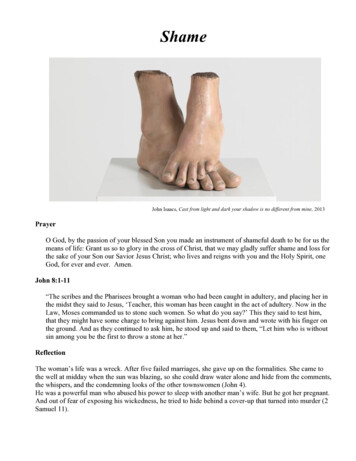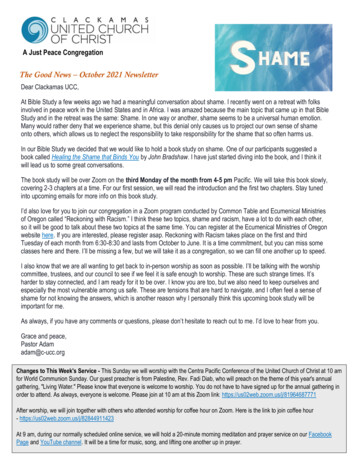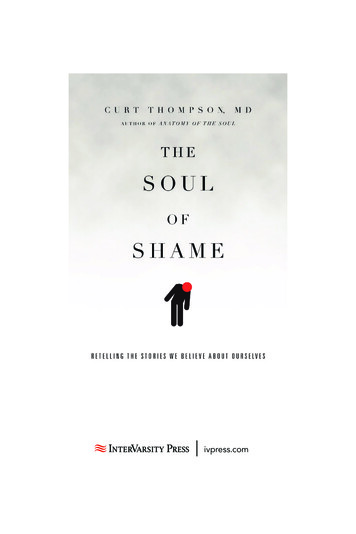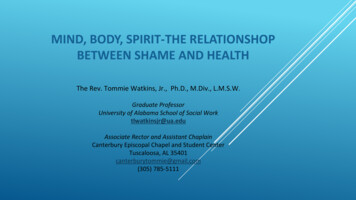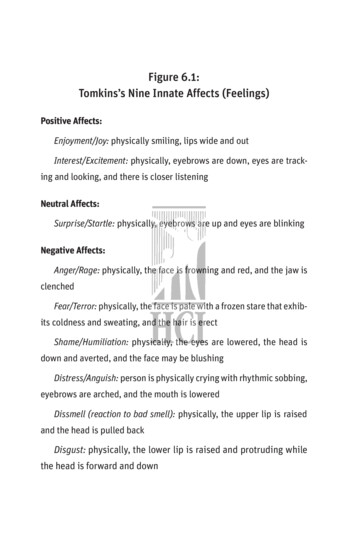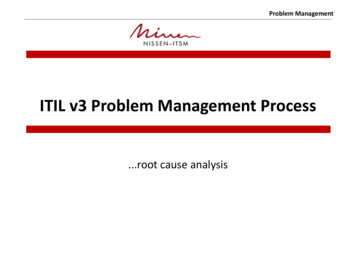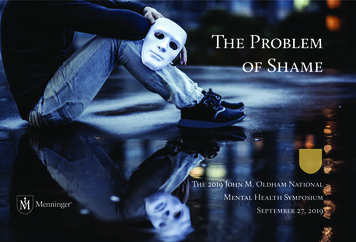
Transcription
The Problemof ShameThe 2019 John M. Oldham NationalMental Health SymposiumSeptember 27, 2019
The Problem of ShameThe 2019 John M. Oldham National Mental Health SymposiumI am delighted to introduceMenninger’s National MentalHealth Symposium for 2019.As many of you will remember,the theme of our first symposiumwas “Mentalization – AnOrganizing Framework forPsychotherapy” followed by“The Problem of Suicide,” bothOldhamwith an outstanding roster ofspeakers. The following year,we focused on “The Problem ofTrauma,” again with a greatlineup of presenters. Moreover,the year after that, our themewas “Emotion Regulation andDysregulation,” a profound problem for a wide range of patients.This year, after considerablediscussion, we decided on“The Problem of Shame” asour central focus. All of us, ofcourse, have secrets that we areashamed of, which we do notreveal to others. However,for some of us, shame is apowerful force to be reckonedwith, fueling persistent anxiety,depression, PTSD, substanceuse, emotion dysregulation, andmany other dysphoric and symp-tomatic states. Freud famouslystated that psychoanalysis waslike archeology since the mainreason some conflicts persistis that they are buried, and theonly way they can be solved is,first, to “dig them up.” However,that is not so easy to do, andthat is where we in the mental health field come in. Withsensitivity and with the rightpace, we can partner with ourpatients to turn painful shameinto release, openness, and even,perhaps, the pride that goeswith conquering our demons.Our speakers this year are allexperts in recognizing andunderstanding the problem ofshame and its importance for allof us—from minor fears of embarrassment to major life roadblocks that can shut us down.I hope we will all, at the end ofthis day, be clearer-headed, moreself-compassionate, and morecourageous as we set about tounearth and dispel those thingswe are ashamed of but may notneed to be.John M. Oldham, MD, MSProgram Chairman2Dr. Oldham is currently Interim Chief of Staff at The Menninger Clinic. He is aDistinguished Emeritus Professor of Psychiatry at Baylor College of Medicine,previously holding the Barbara and Corbin J. Robertson, Jr. Endowed Chair forPersonality Disorders and serving as Senior Vice President and Chief of Staff atThe Menninger Clinic. He is Secretary-General and Fellow of the American Collegeof Psychiatrists (ACPsych). In addition, he is Past President of the following organizations: American Psychiatric Association (APA), ACPsych, New York CountyDistrict Branch of the APA, South Carolina Psychiatric Association, InternationalSociety for the Study of Personality Disorders and Association for Research onPersonality Disorders. He is also a Fellow of the Royal College of Physicians,Edinburgh, and Editor of the Journal of Psychiatric Practice and the Journal ofPersonality Disorders.
September 27 Program8 amRegistration & continental breakfast8:45 amWelcome & introductionJohn M. Oldham, MD, MSThe Menninger Clinic9 amBehind the Walls:Shame in OrganizationsBrené Brown, PhD, LMSWUniversity of Houston10 amShame and Guilt: The Good, the Badand the Ugly RevisitedJune P. Tangney, PhDGeorge Mason University10:45 amMorning Break11 amShame: Listen for ItCynthia Mulder, LCSWThe Menninger Clinic11:45 am“I Thought People Like That ShotThemselves:” The Insidiousnessof LGBTQ ShameMichael R. Kauth, PhD, MenningerDepartment of Psychiatry & BehavioralSciences, Baylor College of Medicine12:30 pmLunch1:30 pmThe Secret of Shame: TransformingBuried Pain into Authenticity and VoiceHarriet Lerner, PhDPrivate Practice2:30 pmThe Feeling that Destroys the Self:The Role of Mentalizing in theCatastrophic Sequelae of ShamePeter Fonagy, PhD, FBAAnna Freud Centre & University CollegeLondon3:15 pmSummary & closing remarksJohn M. Oldham, MD, MSdenotes keynote presentationsREGISTER TODAYPlease register in advanceto help us plan an optimalexperience for you. Lunchand refreshments areincluded.Professional Rate - 250Student Rate - 125Open the registration link tosign up: http://bit.ly/2QcUr14SYMPOSIUM LOCATIONNorris Conference Centers– Houston CityCentre816 Town and Country Blvd,Suite 210Houston, TX 77024713-590-0950Map – KINGAmple free parking is available in the garage attachedto the Norris ConferenceCenters. For direct access,park on the Third Floor ofthe parking garage andfollow the signs to theCenter’s Red Oak Ballroom.For those entering fromHotel Sorella or at street level,note that the Center’s RedOak Ballroom is located onLevel 2, the hotel lobby level.Please give yourself a fewextra minutes in the morningto get to the conferencecenter if you have not beenthere before. Please avoidparking in reserved spots.HOTEL INFORMATIONHotel Sorella800 Sorella CourtHouston, TX 77024713-973-1600Please click this link to HotelSorella to access thesesymposium rates.3
Distinquished Faculty & LecturesBehind the Walls: Shame in OrganizationsBrené Brown, PhD, LMSW – Morning KeynoteWhy is shame often used as a management tool in organizations, schools,and places of worship, and what are the consequences? This presentationwill explore the most common ways shame is used to manage/controlbehavior, motivate performance, and discipline. We will examine the definition of shame that emerged from the data, the ten most common waysshame shows up in organizations, and the four elements of shame resilience. We will also unpack a case study of how an organization responsiblefor safety banned shame-based management in order to save lives.BrownBrown is a research professor at the University of Houston where she holds theHuffington Foundation – Brené Brown Endowed Chair at The Graduate College ofSocial Work. She has spent the past two decades studying courage, vulnerability,shame and empathy, and is the author of five No. 1 New York Times bestsellers:The Gifts of Imperfection, Daring Greatly, Rising Strong, Braving the Wilderness and herlatest book, Dare to Lead, which is the culmination of a seven-year study on courageand leadership. Brown’s TED talk – The Power of Vulnerability – is one of the topfive most viewed TED talks in the world with over 35 million views. She is the firstresearcher to have a filmed talk – The Call to Courage – Netflix, which debutedon the streaming service April 19, 2019. Brown lives in Houston, Texas, with herhusband, Steve, and their children, Ellen and Charlie.Shame and Guilt: The Good, the Bad and the Ugly RevisitedJune Tangney, PhDDecades of research underscore the adaptive functions of guilt and thehigh costs of shame. In this talk, I summarize recent empirical hintsthat shame may have some redeeming value. For whom, and under whatcircumstances is shame most likely to prompt positive, lasting change?Theory, clinical observations, and research with inmates and undergraduatesoffer some insights ripe for further investigation. Guilt, too, is overdue fora more even-handed assessment. I discuss circumstances in which guiltis an inappropriate and psychologically costly response – circumstancesnot assessed by our TOSCA measures. I close by noting the appliedimplications for clinical, correctional, and research contexts.Tangney4Tangney is Professor of Psychology and University Professor at George MasonUniversity. Since arriving at Mason in 1988, Dr. Tangney has researched thedevelopment and implications of moral emotions, with funding from the NationalInstitute on Drug Abuse, the National Institute of Child Health and HumanDevelopment, the National Science Foundation and the John Templeton Foundation.Currently, her work focuses on moral emotions and treatment development forpeople who are incarcerated. Tangney is the author of over 100 articles, booksand book chapters. She is a co-author of Shame and Guilt, co-editor of TheSelf-Conscious Emotions: Theory and Research and co-editor of The Self-ConsciousEmotions: Theory and Research, Shame in the Therapy Hour and the Handbook ofSelf and Identity. She has served as Associate Editor for the American Psychologistand for Self and Identity. She is a Fellow of the American Psychological Associationand the Association for Psychological Science. Tangney received a master’s degreeand doctorate in clinical psychology from UCLA. A recipient of Mason’s TeachingExcellence Award, she strives to integrate service, teaching and clinically relevantresearch in both the classroom and her lab.
Distinquished Faculty & LecturesShame: Listen for ItCynthia Mulder, LCSW“I never knew shame was what I was feeling or part of my struggle.” Shameis highly correlated with depression, addiction, eating disorders, self-harm,trauma and suicide – many of the issues that prompt patients to seektreatment or admission to a psychiatric hospital. Since shame is rarelydiscussed or understood, it continues to impact a patient’s sense of self.A challenge of speaking about shame may unwittingly lead to a patientexperiencing more shame. Mulder will present clinical vignettes toilluminate how the therapist’s ability to listen for shame, whether in individual, group or milieu settings, and find ways to empathically nameand discuss it with patients, is vital to reducing shame’s power and buildresilience. Finally, having a practice of self-compassion and empathy iscritical to re-establishing connection to oneself and others.MulderMulder is the Director of Education and Training at The Menninger Clinic, and anAssistant Professor at Baylor College of Medicine. She is responsible for overseeingthe varied training programs at Menninger, including the Postgraduate Social WorkFellowship. An individual and group therapist, she has run The Daring Way TMgroup on the Professionals Program for more than nine years. She also coordinatesMenninger’s Family Education Day and other continuing education activities forthe hospital and community. After earning a bachelor’s degree from MiddleburyCollege in Middlebury, Vt., she earned a master’s degree from Smith College ofSocial Work in Northampton, Mass., as well as an advanced certificate in clinicalsupervision. Mulder is currently an advanced candidate in analytic training at theCenter for Psychoanalytic Studies in Houston.“I Thought People Like That Shot Themselves:”The Insidiousness of LGBTQ ShameMichael R. Kauth, PhDThe title paraphrases a quote by King George V upon learning a friendwas “homosexual.” Stigma and shame have long been attributed to samesex attraction and behavior and gender variance. Despite greater socialtolerance today, people with lesbian, gay, bisexual, transgender or queer(LGBTQ) identities are often viewed as abnormal, deviant, or sinful. Shamehas surfaced as an unappreciated product of social stigma and internalizedhomo- or trans-negativity. This talk explores the insidiousness of shamearound LGBTQ identities and why coming out is not enough to overcomeshame. Self-affirmation strategies and an affirming framework for clinicalpractice will be discussed.Kauth is a clinical psychologist and Director of the LGBT Health Program, VeteransHealth Administration, a role he shares with Dr. Jillian Shipherd. The LGBT HealthProgram oversees two healthcare policies, clinician training and LGBT Veteran CareCoordinators at each VA facility. Dr. Kauth is also a professor in the Departmentof Psychiatry and Behavioral Sciences at Baylor College of Medicine, where heteaches a course on LGBT Health and presents guest lectures. He has published70 journal articles, three books and 16 book chapters on LGBT veteran health,sexual health, implementation of educational interventions and the evolution ofsame-sex attraction.Kauth5
Distinquished Faculty & LecturesThe Secret of Shame:Transforming Buried Pain into Authenticity and VoiceHarriet Lerner, PhD – Afternoon KeynoteLernerShame is the most debilitating emotion, the most devastating in itsconsequences, and the most difficult to identify and talk about. Its sourcesare both personal and political. This presentation will identify the hiddenfaces of shame and will show how shame erodes self-regard, accountability and the ability to repair broken connections. Clinical implications willbe discussed, including a vignette that illustrates how the hurt and thevulnerable client can find authenticity and voice in the face of shamingmessages from an important authority. The presentation will also clarifythe key role of shame (to be distinguished from guilt) in the unconsciousdynamics of the entrenched non-apologizer with treatment implicationsfor working with those clients who wrap themselves in a blanket ofdefensiveness and denial, and are unable to listen, orient to reality, andtake responsibility for the hurt that they have caused.Lerner is one of our nation’s most respected voices on the psychology of womenand family relationships. She served as a staff psychologist and supervisor atThe Menninger Clinic in Topeka, Kansas, for over two decades, and currently isin private practice. She is the author of numerous scholarly articles and 12 books,including the NYTimes bestseller The Dance of Anger, and most recently, WhyWon’t you Apologize: Healing Big Betrayals and Everyday Hurts.The Feeling that Destroys the Self: The Role ofMentalizing in the Catastrophic Sequelae of ShamePeter Fonagy, PhD, FBAFonagy6Shame is an emotional reaction, a signal of a negative evaluation of theentire self in relation to social and moral standards. It reflects the strippingof agency from the self and is intensified if it is accompanied by a loss ofmentalizing. Mentalizing is a form of social cognition normally supportedby the presence of a social network. Shame forces the individual to disconnect from the network and lose support for mentalizing the experiencewhich social connections normally provide. Experiencing shame in amode of psychic equivalence becomes “ego-destructive” undermines thecontinued existence of the person. The impact of shame is a profoundrelative to guilt. Shame in the context of therapy is an important targetaffect for mentalization. It can be the unnamed “elephant in the room”when, for example, patients fail to gain control over their impulsivebehavior and self-harm or abuse substances. In that context shame isa crucial affect to mentalize because it motivates efforts to disappear,aggression,, and even violence to counteract the feeling of shame. Finally,reactions to shame are threats to the therapist’s mentalizing.Fonagy, OBE, FMedSci, FBA, FAcSS, is professor of Contemporary Psychoanalysis andDevelopmental Science, and Director, Division of Psychology and Language Sciencesat University College London; Chief Executive, Anna Freud National Centre forChildren and Families, London; and Senior National Clinical Advisor, National HealthService England on Children and Young People’s Mental Health. He holds visitingprofessorships at Yale and Harvard Medical Schools and is a training analyst of theBritish Psychoanalytic Society. His clinical interests focus on early attachmentrelationships, social cognition, borderline personality disorder and violence. His published works include 550 scientific papers, 250 chapters and 20 books. He has receiveda number of Lifetime Achievement Awards, and he was the first U.K. recipient of theWiley Prize of the British Academy for Outstanding Achievements in Psychology byan international scholar.
Symposium Purpose & ObjectivesLEARNING PURPOSE STATEMENTThe purpose of this educationalactivity is to expand the knowledgebase and clinical skills of mentalhealth professionals related to theassessment and treatment of thecomplex emotion of shame aslinked to many psychiatric illnesses.By differentiating among shame,guilt, embarrassment and humiliation, clinicians will develop greaterattunement to their client’s strugglesand offer empathic interventions toameliorate this painful, destructiveemotion.TARGET AUDIENCEThis activity is designed for psychiatrists, clinical psychologists,psychiatric registered nurses, socialworkers, licensed professionalcounselors, addictions professionalsand other mental health professionalsin the greater mental health community. (all levels of experience)LEARNING OBJECTIVES1. Define shame and differentiateit from guilt, humiliation and embarrassment. Identify primary waysshame shows up in organizations andarticulate the four elements of shameresilience.2. Articulate the difference betweenshame and guilt and become familiarwith findings underscoring the highcosts of shame as well as recentresearch suggesting potentialadaptive functions of this painfulmoral emotion.3. Identify how to listen for shameand other self-conscious affectsin various therapeutic modalities,respond with curiosity and empathy,and provide ways for thepatient to externalize andrecognize its presence.4. Distinguish betweenstigma and shame, explainthe role of shame in maintaining self-hatred in peoplewith LGBT identities anddescribe affirming techniquesfor overcoming shame.5. Identify the role ofshame in understanding thedynamics of the entrenchednon-apologizer and assistthe vulnerable client to findcourage and voice.6. Identify aspects of shamereaction that are associatedwith loss of mentalizing andarticulate tools to elicit andrecognize shame to addressunmentalized content.Continuing Education CreditsThe Menninger Clinic has awarded5.0 Contact/Credit/Clock hours tothe following disciplines:an accredited approver with distinction,by the American Nurses CredentialingCenter’s Commission on Accreditation.Physicians: The Menninger Clinicis accredited by the AccreditationCouncil for Continuing Medical Education (ACCME) to provide continuingmedical education for physicians.Social Workers: The Menninger Clinic,Provider #4586, is approved by theTexas State Board of Social WorkerExaminers to offer continuing education for Social Workers. This activity isoffered for 5.0 continuing educationcontact hours for social workers.We adhere to the Texas State Board ofSocial Worker Examiners ContinuingEducation Guidelines.The Menninger Clinic designates thislive activity for a maximum of 5.0AMA PRA Category 1 Credits .Psychologists: The MenningerClinic is approved by the AmericanPsychological Association to sponsorcontinuing education for psychologists. The Menninger Clinic maintainsresponsibility for this program andits content.Registered Nurses: The MenningerClinic is an approved provider ofcontinuing nursing education by theTexas Nurses Association – Approver,Addictions Professionals: Menningeris approved by the Texas CertificationBoard of Addiction Professionals(TCBAP) Standards Committee,Provider No. 1741-06, five (5.0) hoursgeneral. Expires 7/2020. Complaintsabout provider or workshop contentmay be directed to the TCBAPStandards Committee, 401 RanchRoad 620 S., Suite 310,Austin, Texas 78734, fax number 888-506-8123.Licensed ProfessionalCounselors: The MenningerClinic has been approved byNational Board for CertifiedCounselors (NBCC) as anApproved Continuing Education Provider, ACEP No. 5139.Programs that do not qualifyfor NBCC credit are clearlyidentified. The MenningerClinic is solely responsible forall aspects of the programs.Certificates ofAttendance willbe awarded forall otherparticipants.
The Problemof ShameSeptember 27, 201912301 Main StreetHouston, TX 77035Nonprofit Org.U.S. PostagePAIDHouston, TXPermit No. 114
Brown is a research professor at the University of Houston where she holds the Huffington Foundation – Brené Brown Endowed Chair at The Graduate College of Social Work. She has spent the past two decades studying courage, vulnerability, shame and empathy, an
